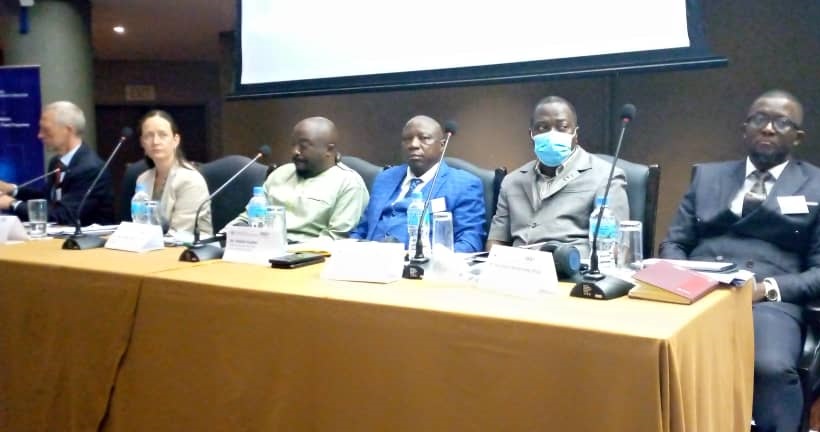More than 70 representatives from border law enforcement, security, and civil aviation agencies from 17 West African countries met this week in Freetown for the First Meeting of the West Africa Regional Informal Working Group (IWG) under the framework of the Countering Terrorist Travel Programme,” a release from the agencies states.
“This meeting is an opportunity to raise awareness about the spread of terrorism through the movement of Foreign Terrorist Fighters,” stated Jacob Jusu Saffa, Chief Minister of Sierra Leone.
As global travel resumes in the wake of the COVID-19 pandemic, members of terrorist groups and other transnational organised crime groups will continue to take advantage of existing pressures on air, land and maritime borders across the globe, exploiting the increasing connectivity offered by airlines in all regions of the world.
The collection and processing of Advance Passenger Information (API) and Passenger Name Records (PNR), are therefore an essential tool to combat transnational crimes, through the identification, detection, and interception of terrorist, including Foreign Terrorist Fighters (FTFs), and other serious criminals.
In 2019, the United Nations Countering Terrorist Travel (‘CT Travel’) Programme was launched to support Member States respond to this growing threat. The CT Travel Programme is a global initiative that aims to build Member States capacities to prevent, detect, investigate and prosecute terrorist offences and other serious crimes, including their related travel, by collecting and analyzing passenger data, both API and PNR, in line with United Nations Security Council resolutions, international standards and best practices and human rights principles.
Implemented through an “All-of-UN” approach, the CT Travel Programme is led by the United Nations Office on Counter Terrorism (UNOCT) and implemented in close partnership with the United Nations Counter-Terrorism Committee Executive Directorate (CTED), the United Nations Office on Drugs and Crime (UNODC) (through the Airport Communication Programme, AIRCOP, and the Terrorism Prevention Branch), the United Nations Office of Information and Communications Technology (OICT), the International Civil Aviation Organization (ICAO), and the International Criminal Police Organization (INTERPOL) and in cooperation with the International Organization for Migration (IOM).
AIRCOP through its recognized specific operational experience and support to inter-agency unit working on air passenger data (the AIRCOP Joint Airport Interdiction Task Forces), oversees Pillar 2 on the operationalization of the PIUs.
Within the framework of the CT Travel Programme, the West Africa IWG was launched to foster the sharing of best practices, lessons learned and enable the widest possible cooperation and exchange of information between Passenger Information Units in the region. West Africa has the highest concentration of CT Travel programme beneficiary Member States and AIRCOP is implemented in 15 airports within the region.
Jointly organized by UNOCT and UNODC, and hosted by the Government of Sierra Leone, the inaugural meeting of the West Africa IWG took place from 12 to 13 May in Freetown. The event allowed participants to gain a better understanding of the efforts being made by Member States in the region, thanks to a regional situational analysis of API and PNR systems shared by the International Air Transport Association (IATA). International databases, API and PNR collection in various cross-border transportation modalities, legal frameworks, and real-time communication channels were key points of discussion.
Dr Amado Philip de Andrés, UNODC Regional Director for West and Central Africa, noted “It is by analysing all travel modalities at the national and international levels and by adopting a common approach among all countries in the region that we will be more proactive in our fight”. Also “Passenger Name Record data processing will be a major undertaking for your countries in the coming years and will require the implementation of efficient infrastructures”.
Flagging the importance of the international framework for countering terrorist travel using passenger data, Ms Christine Bradley, UNOCT Chief of Countering Terrorist Travel Section, pointed to the event ‘’as an essential step towards implementing the ‘relevant UN Security Council resolutions, namely 2178, 2396 and 2482 which oblige all UN Member States to collect both API and PNR data for the purposes of countering terrorism and serious crime‘’.
To facilitate initial technical discussions among the IWG States, participants were divided into small groups to conduct brainstorming sessions on specific technical issues. Each small group was moderated by the newly appointed thematic sub-group leaders, that will also propose a schedule of thematic meetings for the rest of 2022.




 Post a comment
Post a comment









Comment(s)
Disclaimer: Comments expressed here do not reflect the opinions of Sierraloaded or any employee thereof.
Be the first to comment